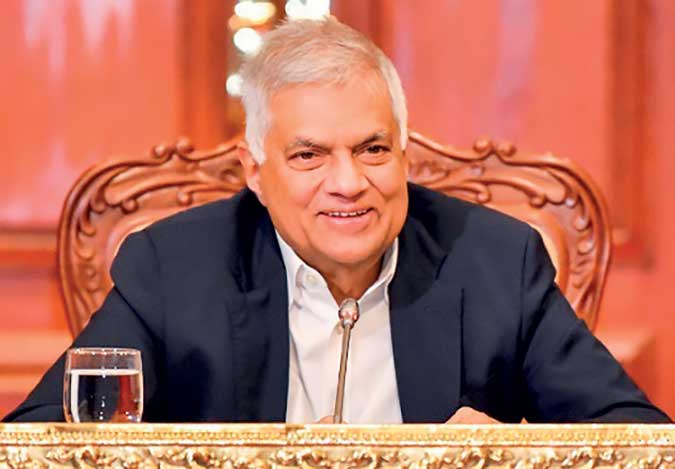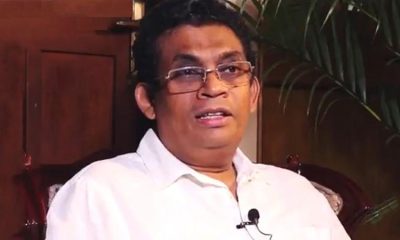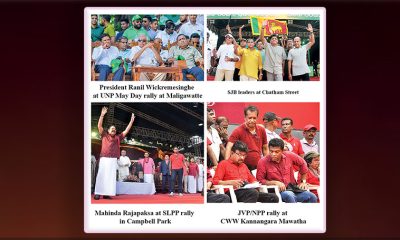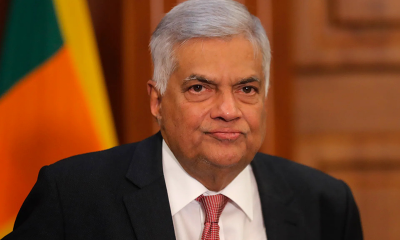Features
Presidential insecurity in spite of power and performance

by Rajan Philips
The political posturing over debt ‘optimization’ is just that. Posturing! Those who were waiting in anticipation for the President to order a crewcut to the local banks, are now howling that the banks have been let off with ponytails of profits while the working classes were not given the same concession by leaving their hard earned EPF contributions similarly untouched. A loss of depositor confidence in the banks, which any haircut could have triggered, would have been a far worse and instantaneous disaster than Gotabaya Rajapaksa’s organic fertilizer fiasco. The government to its credit would seem to have avoided it quite neatly.
Equally, the adjustments to the EPF’s returns on its bond savings will play over the long run and will have little or no impact on immediate retirees, or others retiring in the short term or even the medium term. In the long term, not to forget the Keynesian wisdom that most of us will be dead, the economy is supposed to be doing well for the living. That’s the premise for policy. There is no policy making assuming perpetual doom.
The politics over debt is turning out to be a victory for President Wickremesinghe. Once again the opposition in parliament is left playing catch-up. This has been the case ever since Ranil Wickremesinghe became caretaker President. Yet, for all his Teflon performances on the economic front, the President remains politically vulnerable. Unlike other politicians, however, he is quite aware of his vulnerability politically and more so electorally.
To wit, his indefinite postponement of the local elections, maneuvering the timing of the presidential election to his advantage, and playing chess games with provincial and parliamentary elections. He keeps most people guessing and his potential adversaries confused. Add to all this the recent changing of guards in the Election Commission under his direct oversight. Clever and proactive as these moves are, they are also indicative of the level of political insecurity the President harbours in spite of the near-monarchical powers that he effortlessly wields.
External Validation
Evidence of this insecurity manifested itself quite patently in the revelations President Wickremesinghe made in London, in the course of a seemingly soulmate chat with the former Canadian Prime Minister and arch conservative Stephen Harper. The President was en route to Paris for the global debt summit convened by middle-of-the-road French President Emmanuel Macron. He stopped over in London to attend the 40th anniversary event (June 20-21) of the International Democrat Union (IDU), whose current Chairman is Stephen Harper.
The fact that the President chose to reveal details about the last moments of the Gotabaya Rajapaksa presidency and the early moments of his own at the anniversary event of the IDU says a great deal about Ranil Wickremesinghe’s political sympathies and his craving for external validation. The transcript of the conversation released by the PMD in Colombo shows Mr. Harper confirming their ideological affinities straddling the global north-south divide and their mutual deification of the free run marketplace.
The International Democratic Union is the mutual admiration society of the Global Right that was created in 1983 at the height of the Reagan-Thatcher era in Western politics. The membership includes centre-right and rightwing parties, but the organization leans far more right than centre-right. The founding members were 19 conservative parties, 18 of whom were from the West and one from Japan. Prominent signatories included Margaret Thatcher, Helmet Kohl and Jacques Chirac. The main sponsors were Germany’s Konrad Adenauer Foundation and then US Vice President George H.W. Bush.
Today there are 84 members representing conservative parties from the Global South. Members from South Asia include the Bangladesh Nationalist Party, India’s Bharatiya Janata Party, the Maldivian Democratic Party, and Sri Lanka’s United National Party. The BNP is in opposition, the BJP and MDP are in government, and the UNP is listed in the IDU website as an alliance with one member out of 225 in parliament, not to mention the Executive President. I do not know when the UNP became a member of the IDU, but I do know that no other UNP leader has invested so much time and travel on the IDU as Ranil Wickremesinghe.
Stephen Harper became Chairperson of the Union in 2018 after his electoral defeat in 2015 and retirement from national politics. In October 2018, when Maithripala Sirisena created a home-made constitutional crisis and fired Ranil Wickremesinghe as Prime Minister, Harper as Chairperson of the IDU released a statement denouncing Sirisena’s unconstitutional misadventure and expressing solidarity with then Prime Minister Ranil Wickremesinghe. Five years later, Ranil Wickremesinghe has become Sri Lanka’s first unelected (to parliament) President and had the occasion to recount to Stephen Harper in London the circumstances surrounding his sudden ascent to power after a crushing defeat at the hustings.
The Uncle and the Nephew
Stephen Harper is a dyed-in-the-wool conservative who took the Progressive Conservative Party of Canada that had traditionally been to the left of the Democratic Party in the US, all the way to the right of the US Republican Party. In international relations, he has been more hawkish than Thatcher and broke with Canada’s long foreign policy tradition of neutral middle power diplomacy observed by both Liberal and Conservative Prime Ministers. In internal Canadian politics, Harper used his conservative ideology to build support for his Party among immigrants from non-western countries by finding common cause with the inherently conservative and rightwing biases among swaths of the immigrant populations regardless of their racial or spatial origins.
Ranil Wickremesinghe is not a rightwing ideologue in the same mould as Stephen Harper, probably because of Sri Lanka’s political traditions involving a politically strong Left, politically and electorally strong centre-Left, and an all-party commitment to social welfarism. Before he became caretaker President, Ranil Wickremesinghe presented himself as an advocate of the ‘social market economy’ – a concept that was developed in West Germany after World War II, as a middle-of-the-road alternative between free-market capitalism and socialism. There hasn’t been much talk about the social market economy after RW became caretaker President.
On the contrary, the President has been using code words to blame social welfarism and socialism. To wit, blaming past political leaders for avoiding hard decisions and implementing policies that were popular with the voters; and making foreign policy decisions for partisan political benefits rather than to support national economic interests. For whatever reason, Ranil Wickremesinghe is not prepared to use the word socialism hypocritically, the way JR Jayewardene did in choosing the long title for the country: The Democratic Socialist Republic of Sri Lanka.
On matters of real policy and initiatives, however, there is no daylight between the uncle and the nephew. Even on the question of changing the system of executive presidency, Mr. Wickremesinghe has walked backed on his earlier promises and by positioning himself as a candidate for the next presidential election he is effectively cementing forever the practice of electing the President directly by the people.
What is more, Mr. Wickremesinghe is not content with saving the economy and reaping the reward of an elected term as President. He wants to change the contours of politics – by passing baleful laws, imposing stringent regulations, cultivating security forces to put down protesters, and bending the government machinery and independent commissions (like the Election Commission) to do his bidding.
If the President were to take care of the economy equally apolitically the national goodwill for him will spillover beyond political bounds. He would be venerated as the best caretaker Head of State and Head of Government Sri Lanka ever had. But inasmuch as Mr. Wickremesinghe tries to secure an elected term as President as his political reward for taking care of the economy, he is not going to be able to cash all the goodwill he might garner in his economic portfolio into large enough votes to win a presidential election.
Most of all, the President has no coherent political platform, he does not have the support of a cohesive political alliance, and he does not have a committed political following in the country other than due respect and apolitical goodwill for his handling of the economic situation. Sadly for the country, all of the above shortcomings of President Wickremesinghe are mirrored by his opponents and detractors. Between the two (the President and his detractors) there is no prospect for a positively radical breakthrough for the country.
The President has set a generous timeframe (till 2048) for the country to reach economic prosperity. But what is transpiring from one day to another – in terms of corruption, political meddling and dysfunctional institutions – is no different from what has been transpiring from the time the Rajapaksas got their collective hands on the levers of state power. The President is not interested in changing any of this. His opponents, on the other hand, are incapable of even holding the President accountable, let alone having the capability to change anything.
Features
The heart-friendly health minister

by Dr Gotabhya Ranasinghe
Senior Consultant Cardiologist
National Hospital Sri Lanka
When we sought a meeting with Hon Dr. Ramesh Pathirana, Minister of Health, he graciously cleared his busy schedule to accommodate us. Renowned for his attentive listening and deep understanding, Minister Pathirana is dedicated to advancing the health sector. His openness and transparency exemplify the qualities of an exemplary politician and minister.
Dr. Palitha Mahipala, the current Health Secretary, demonstrates both commendable enthusiasm and unwavering support. This combination of attributes makes him a highly compatible colleague for the esteemed Minister of Health.
Our discussion centered on a project that has been in the works for the past 30 years, one that no other minister had managed to advance.
Minister Pathirana, however, recognized the project’s significance and its potential to revolutionize care for heart patients.
The project involves the construction of a state-of-the-art facility at the premises of the National Hospital Colombo. The project’s location within the premises of the National Hospital underscores its importance and relevance to the healthcare infrastructure of the nation.
This facility will include a cardiology building and a tertiary care center, equipped with the latest technology to handle and treat all types of heart-related conditions and surgeries.
Securing funding was a major milestone for this initiative. Minister Pathirana successfully obtained approval for a $40 billion loan from the Asian Development Bank. With the funding in place, the foundation stone is scheduled to be laid in September this year, and construction will begin in January 2025.
This project guarantees a consistent and uninterrupted supply of stents and related medications for heart patients. As a result, patients will have timely access to essential medical supplies during their treatment and recovery. By securing these critical resources, the project aims to enhance patient outcomes, minimize treatment delays, and maintain the highest standards of cardiac care.
Upon its fruition, this monumental building will serve as a beacon of hope and healing, symbolizing the unwavering dedication to improving patient outcomes and fostering a healthier society.We anticipate a future marked by significant progress and positive outcomes in Sri Lanka’s cardiovascular treatment landscape within the foreseeable timeframe.
Features
A LOVING TRIBUTE TO JESUIT FR. ALOYSIUS PIERIS ON HIS 90th BIRTHDAY

by Fr. Emmanuel Fernando, OMI
Jesuit Fr. Aloysius Pieris (affectionately called Fr. Aloy) celebrated his 90th birthday on April 9, 2024 and I, as the editor of our Oblate Journal, THE MISSIONARY OBLATE had gone to press by that time. Immediately I decided to publish an article, appreciating the untiring selfless services he continues to offer for inter-Faith dialogue, the renewal of the Catholic Church, his concern for the poor and the suffering Sri Lankan masses and to me, the present writer.
It was in 1988, when I was appointed Director of the Oblate Scholastics at Ampitiya by the then Oblate Provincial Fr. Anselm Silva, that I came to know Fr. Aloy more closely. Knowing well his expertise in matters spiritual, theological, Indological and pastoral, and with the collaborative spirit of my companion-formators, our Oblate Scholastics were sent to Tulana, the Research and Encounter Centre, Kelaniya, of which he is the Founder-Director, for ‘exposure-programmes’ on matters spiritual, biblical, theological and pastoral. Some of these dimensions according to my view and that of my companion-formators, were not available at the National Seminary, Ampitiya.
Ever since that time, our Oblate formators/ accompaniers at the Oblate Scholasticate, Ampitiya , have continued to send our Oblate Scholastics to Tulana Centre for deepening their insights and convictions regarding matters needed to serve the people in today’s context. Fr. Aloy also had tried very enthusiastically with the Oblate team headed by Frs. Oswald Firth and Clement Waidyasekara to begin a Theologate, directed by the Religious Congregations in Sri Lanka, for the contextual formation/ accompaniment of their members. It should very well be a desired goal of the Leaders / Provincials of the Religious Congregations.
Besides being a formator/accompanier at the Oblate Scholasticate, I was entrusted also with the task of editing and publishing our Oblate journal, ‘The Missionary Oblate’. To maintain the quality of the journal I continue to depend on Fr. Aloy for his thought-provoking and stimulating articles on Biblical Spirituality, Biblical Theology and Ecclesiology. I am very grateful to him for his generous assistance. Of late, his writings on renewal of the Church, initiated by Pope St. John XX111 and continued by Pope Francis through the Synodal path, published in our Oblate journal, enable our readers to focus their attention also on the needed renewal in the Catholic Church in Sri Lanka. Fr. Aloy appreciated very much the Synodal path adopted by the Jesuit Pope Francis for the renewal of the Church, rooted very much on prayerful discernment. In my Religious and presbyteral life, Fr.Aloy continues to be my spiritual animator / guide and ongoing formator / acccompanier.
Fr. Aloysius Pieris, BA Hons (Lond), LPh (SHC, India), STL (PFT, Naples), PhD (SLU/VC), ThD (Tilburg), D.Ltt (KU), has been one of the eminent Asian theologians well recognized internationally and one who has lectured and held visiting chairs in many universities both in the West and in the East. Many members of Religious Congregations from Asian countries have benefited from his lectures and guidance in the East Asian Pastoral Institute (EAPI) in Manila, Philippines. He had been a Theologian consulted by the Federation of Asian Bishops’ Conferences for many years. During his professorship at the Gregorian University in Rome, he was called to be a member of a special group of advisers on other religions consulted by Pope Paul VI.
Fr. Aloy is the author of more than 30 books and well over 500 Research Papers. Some of his books and articles have been translated and published in several countries. Among those books, one can find the following: 1) The Genesis of an Asian Theology of Liberation (An Autobiographical Excursus on the Art of Theologising in Asia, 2) An Asian Theology of Liberation, 3) Providential Timeliness of Vatican 11 (a long-overdue halt to a scandalous millennium, 4) Give Vatican 11 a chance, 5) Leadership in the Church, 6) Relishing our faith in working for justice (Themes for study and discussion), 7) A Message meant mainly, not exclusively for Jesuits (Background information necessary for helping Francis renew the Church), 8) Lent in Lanka (Reflections and Resolutions, 9) Love meets wisdom (A Christian Experience of Buddhism, 10) Fire and Water 11) God’s Reign for God’s poor, 12) Our Unhiddden Agenda (How we Jesuits work, pray and form our men). He is also the Editor of two journals, Vagdevi, Journal of Religious Reflection and Dialogue, New Series.
Fr. Aloy has a BA in Pali and Sanskrit from the University of London and a Ph.D in Buddhist Philosophy from the University of Sri Lankan, Vidyodaya Campus. On Nov. 23, 2019, he was awarded the prestigious honorary Doctorate of Literature (D.Litt) by the Chancellor of the University of Kelaniya, the Most Venerable Welamitiyawe Dharmakirthi Sri Kusala Dhamma Thera.
Fr. Aloy continues to be a promoter of Gospel values and virtues. Justice as a constitutive dimension of love and social concern for the downtrodden masses are very much noted in his life and work. He had very much appreciated the commitment of the late Fr. Joseph (Joe) Fernando, the National Director of the Social and Economic Centre (SEDEC) for the poor.
In Sri Lanka, a few religious Congregations – the Good Shepherd Sisters, the Christian Brothers, the Marist Brothers and the Oblates – have invited him to animate their members especially during their Provincial Congresses, Chapters and International Conferences. The mainline Christian Churches also have sought his advice and followed his seminars. I, for one, regret very much, that the Sri Lankan authorities of the Catholic Church –today’s Hierarchy—- have not sought Fr.
Aloy’s expertise for the renewal of the Catholic Church in Sri Lanka and thus have not benefited from the immense store of wisdom and insight that he can offer to our local Church while the Sri Lankan bishops who governed the Catholic church in the immediate aftermath of the Second Vatican Council (Edmund Fernando OMI, Anthony de Saram, Leo Nanayakkara OSB, Frank Marcus Fernando, Paul Perera,) visited him and consulted him on many matters. Among the Tamil Bishops, Bishop Rayappu Joseph was keeping close contact with him and Bishop J. Deogupillai hosted him and his team visiting him after the horrible Black July massacre of Tamils.
Features
A fairy tale, success or debacle

Sri Lanka-Singapore Free Trade Agreement
By Gomi Senadhira
senadhiragomi@gmail.com
“You might tell fairy tales, but the progress of a country cannot be achieved through such narratives. A country cannot be developed by making false promises. The country moved backward because of the electoral promises made by political parties throughout time. We have witnessed that the ultimate result of this is the country becoming bankrupt. Unfortunately, many segments of the population have not come to realize this yet.” – President Ranil Wickremesinghe, 2024 Budget speech
Any Sri Lankan would agree with the above words of President Wickremesinghe on the false promises our politicians and officials make and the fairy tales they narrate which bankrupted this country. So, to understand this, let’s look at one such fairy tale with lots of false promises; Ranil Wickremesinghe’s greatest achievement in the area of international trade and investment promotion during the Yahapalana period, Sri Lanka-Singapore Free Trade Agreement (SLSFTA).
It is appropriate and timely to do it now as Finance Minister Wickremesinghe has just presented to parliament a bill on the National Policy on Economic Transformation which includes the establishment of an Office for International Trade and the Sri Lanka Institute of Economics and International Trade.
Was SLSFTA a “Cleverly negotiated Free Trade Agreement” as stated by the (former) Minister of Development Strategies and International Trade Malik Samarawickrama during the Parliamentary Debate on the SLSFTA in July 2018, or a colossal blunder covered up with lies, false promises, and fairy tales? After SLSFTA was signed there were a number of fairy tales published on this agreement by the Ministry of Development Strategies and International, Institute of Policy Studies, and others.
However, for this article, I would like to limit my comments to the speech by Minister Samarawickrama during the Parliamentary Debate, and the two most important areas in the agreement which were covered up with lies, fairy tales, and false promises, namely: revenue loss for Sri Lanka and Investment from Singapore. On the other important area, “Waste products dumping” I do not want to comment here as I have written extensively on the issue.
1. The revenue loss
During the Parliamentary Debate in July 2018, Minister Samarawickrama stated “…. let me reiterate that this FTA with Singapore has been very cleverly negotiated by us…. The liberalisation programme under this FTA has been carefully designed to have the least impact on domestic industry and revenue collection. We have included all revenue sensitive items in the negative list of items which will not be subject to removal of tariff. Therefore, 97.8% revenue from Customs duty is protected. Our tariff liberalisation will take place over a period of 12-15 years! In fact, the revenue earned through tariffs on goods imported from Singapore last year was Rs. 35 billion.
The revenue loss for over the next 15 years due to the FTA is only Rs. 733 million– which when annualised, on average, is just Rs. 51 million. That is just 0.14% per year! So anyone who claims the Singapore FTA causes revenue loss to the Government cannot do basic arithmetic! Mr. Speaker, in conclusion, I call on my fellow members of this House – don’t mislead the public with baseless criticism that is not grounded in facts. Don’t look at petty politics and use these issues for your own political survival.”
I was surprised to read the minister’s speech because an article published in January 2018 in “The Straits Times“, based on information released by the Singaporean Negotiators stated, “…. With the FTA, tariff savings for Singapore exports are estimated to hit $10 million annually“.
As the annual tariff savings (that is the revenue loss for Sri Lanka) calculated by the Singaporean Negotiators, Singaporean $ 10 million (Sri Lankan rupees 1,200 million in 2018) was way above the rupees’ 733 million revenue loss for 15 years estimated by the Sri Lankan negotiators, it was clear to any observer that one of the parties to the agreement had not done the basic arithmetic!
Six years later, according to a report published by “The Morning” newspaper, speaking at the Committee on Public Finance (COPF) on 7th May 2024, Mr Samarawickrama’s chief trade negotiator K.J. Weerasinghehad had admitted “…. that forecasted revenue loss for the Government of Sri Lanka through the Singapore FTA is Rs. 450 million in 2023 and Rs. 1.3 billion in 2024.”
If these numbers are correct, as tariff liberalisation under the SLSFTA has just started, we will pass Rs 2 billion very soon. Then, the question is how Sri Lanka’s trade negotiators made such a colossal blunder. Didn’t they do their basic arithmetic? If they didn’t know how to do basic arithmetic they should have at least done their basic readings. For example, the headline of the article published in The Straits Times in January 2018 was “Singapore, Sri Lanka sign FTA, annual savings of $10m expected”.
Anyway, as Sri Lanka’s chief negotiator reiterated at the COPF meeting that “…. since 99% of the tariffs in Singapore have zero rates of duty, Sri Lanka has agreed on 80% tariff liberalisation over a period of 15 years while expecting Singapore investments to address the imbalance in trade,” let’s turn towards investment.
Investment from Singapore
In July 2018, speaking during the Parliamentary Debate on the FTA this is what Minister Malik Samarawickrama stated on investment from Singapore, “Already, thanks to this FTA, in just the past two-and-a-half months since the agreement came into effect we have received a proposal from Singapore for investment amounting to $ 14.8 billion in an oil refinery for export of petroleum products. In addition, we have proposals for a steel manufacturing plant for exports ($ 1 billion investment), flour milling plant ($ 50 million), sugar refinery ($ 200 million). This adds up to more than $ 16.05 billion in the pipeline on these projects alone.
And all of these projects will create thousands of more jobs for our people. In principle approval has already been granted by the BOI and the investors are awaiting the release of land the environmental approvals to commence the project.
I request the Opposition and those with vested interests to change their narrow-minded thinking and join us to develop our country. We must always look at what is best for the whole community, not just the few who may oppose. We owe it to our people to courageously take decisions that will change their lives for the better.”
According to the media report I quoted earlier, speaking at the Committee on Public Finance (COPF) Chief Negotiator Weerasinghe has admitted that Sri Lanka was not happy with overall Singapore investments that have come in the past few years in return for the trade liberalisation under the Singapore-Sri Lanka Free Trade Agreement. He has added that between 2021 and 2023 the total investment from Singapore had been around $162 million!
What happened to those projects worth $16 billion negotiated, thanks to the SLSFTA, in just the two-and-a-half months after the agreement came into effect and approved by the BOI? I do not know about the steel manufacturing plant for exports ($ 1 billion investment), flour milling plant ($ 50 million) and sugar refinery ($ 200 million).
However, story of the multibillion-dollar investment in the Petroleum Refinery unfolded in a manner that would qualify it as the best fairy tale with false promises presented by our politicians and the officials, prior to 2019 elections.
Though many Sri Lankans got to know, through the media which repeatedly highlighted a plethora of issues surrounding the project and the questionable credentials of the Singaporean investor, the construction work on the Mirrijiwela Oil Refinery along with the cement factory began on the24th of March 2019 with a bang and Minister Ranil Wickremesinghe and his ministers along with the foreign and local dignitaries laid the foundation stones.
That was few months before the 2019 Presidential elections. Inaugurating the construction work Prime Minister Ranil Wickremesinghe said the projects will create thousands of job opportunities in the area and surrounding districts.
The oil refinery, which was to be built over 200 acres of land, with the capacity to refine 200,000 barrels of crude oil per day, was to generate US$7 billion of exports and create 1,500 direct and 3,000 indirect jobs. The construction of the refinery was to be completed in 44 months. Four years later, in August 2023 the Cabinet of Ministers approved the proposal presented by President Ranil Wickremesinghe to cancel the agreement with the investors of the refinery as the project has not been implemented! Can they explain to the country how much money was wasted to produce that fairy tale?
It is obvious that the President, ministers, and officials had made huge blunders and had deliberately misled the public and the parliament on the revenue loss and potential investment from SLSFTA with fairy tales and false promises.
As the president himself said, a country cannot be developed by making false promises or with fairy tales and these false promises and fairy tales had bankrupted the country. “Unfortunately, many segments of the population have not come to realize this yet”.
(The writer, a specialist and an activist on trade and development issues . )
























